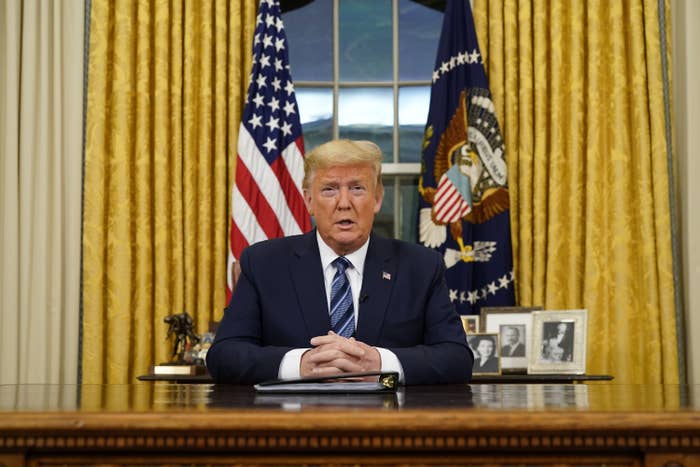
The US is suspending travel from much of Europe to the United States for at least 30 days in an effort to stop new clusters of the novel coronavirus from sprouting across the country.
President Donald Trump announced the new sweeping travel restrictions during an address Wednesday night from the Oval Office. The rules go into effect at 11:59 p.m. Friday, according to a White House spokesperson.
"To keep new cases from entering our shores, we will be suspending all travel from Europe to the United States for the next 30 days," Trump said.
Trump's announcement prompted questions Wednesday night, and administration officials later clarified the travel restrictions would only apply to foreign nationals who had been present in 26 European countries during the two weeks prior to their arrival to the US. The restrictions will not apply to US citizens, legal permanent residents, and their family members — and in spite of what Trump said during his address — trade and cargo will also not be affected.
Acting DHS secretary Chad Wolf applauded the president's actions in a statement, saying that it would protect the American people.
"The actions President Trump is taking to deny entry to foreign nationals who have been in affected areas will keep Americans safe and save American lives," Wolf said.
He said the ban, which was instituted through a presidential proclamation, would suspend entry to “most foreign nationals” who have been in certain European countries — Austria, France, Germany, Greece, Italy, and many others — in the last 14 days prior to their arrival to the US. The UK is not included in the ban.
As of Wednesday, more than 1,200 people in the US have tested positive for COVID-19, the disease caused by a novel coronavirus first identified late last year in Wuhan, China, and 36 have died.
Though the virus originated in China, it has become a global pandemic. The virus has been spreading within US communities for weeks, causing large conferences, concerts, and other events to be canceled, forcing schools to close, and leading to quarantines of communities.
“This is the most aggressive and comprehensive effort to confront a foreign virus in modern history," Trump said.
During his remarks, Trump placed blame on the European Union for the increase in cases in the US.
A widespread outbreak in Italy has forced government officials there to lock down the entire country until at least April 3. On Wednesday, the government said it would temporarily close all nonessential commercial services and shops, including restaurants, bars, and hairdressers.
"The European Union failed to take the same precautions and restrict travel from China and other hot spots," Trump said. "As a result, a large number of new clusters in the United States were seeded by travelers from Europe."
The proclamation states that the US government cannot "effectively evaluate and monitor" all travelers arriving from the Schengen Area, an area comprised of 26 European countries, including Austria, France, Germany, Spain, and Italy. The area currently has the largest number of confirmed cases of COVID-19 outside of China, according to the proclamation.
"The potential for undetected transmission of the virus by infected individuals seeking to enter the United States from the Schengen Area threatens the security of our transportation system and infrastructure and the national security," the document states.
Immigration experts quickly criticized the move, saying that the government's focus should be at home.
“The virus is here in the US. The focus needs to be on taking action here — treating people and testing people — this seems to be pointless," John Sandweg, a former senior Department of Homeland Security official in the Obama administration, told BuzzFeed News. "This is not going to be terribly effective and distracts from where the focus needs to be."
Sandweg said the move may lead to some confusion, adding that enforcement would be "a challenge."
“Sealing off one country from another is next to impossible," said Sarah Pierce, an analyst at Migration Policy Institute. "If the Europe ban is similar to the bans on nationals from Iran and China, it will have large exceptions, because it is legally, morally, and logistically impossible to close off our borders in this globalized world."
Pierce described the restrictions as "the biggest and most comprehensive" travel ban in response to a public health threat in US history.
UPDATE
This post has been updated after the White House corrected information on the time when the restrictions will take effect, who it will cover, and whether trade and cargo will be impacted.

